BSR S3 Ecosystem
Smart specialisation helps regions to use their strengths to boost growth and prosperity. Yet, many regions lack methods or institutional frameworks to implement it successfully. The BSR S3 Ecosystem platform aligned smart specialisation initiatives to better steer investments across the Baltic Sea region. By sharing best practices, it activated research and academic communities, industry and public entities to strengthen the regional innovation ecosystem.
Projects represented in the platform:
- Interreg Baltic Sea Region: LARS | BSR Stars S3 | Smart-up BSR | GoSmart BSR
- Interreg Europe: S34 Growth | BIOREGIO | ClusterFY | TraCS3
Budgets
in numbers
-
1.27MillionTotal
-
0.76MillionErdf
-
0.18MillionEni + Russia
-
0.03MillionNorway
Achievements
Synthesising knowledge on smart specialisation strategies
The BSR S3 Ecosystem project platform synthesised the knowledge from ten Interreg Baltic Sea Region and Interreg Europe projects that helped implement smart specialisation strategies (S3). The partners brought together different approaches to S3 implementation, and shared what benefits and challenges they had. Over 200 S3 stakeholders from regional ministries and development agencies from ten Baltic Sea region countries learned how to strengthen innovation ecosystems for successful implementation of S3 on the regional and inter-regional levels. They discussed how to promote stronger diversity and inclusion in S3, connect different actors to increase the collaborative dynamic, develop green transition pathways for different sectors across the BSR, with circular economy at the core. In addition, they learned about the political leadership as a key enabler of change. Political motivation and commitment are the first steps to boost efforts towards interregional innovation investments.
More cooperation on smart specialisation across regions
The platform also supported regions in developing thematic value chains linked to smart specialisation priorities. The partners developed a methodology for the analysis of value chains and piloted it in the area of the circular bioeconomy. They selected this area as it was highly relevant for S3. All in all, 16 regions from seven countries shared their insights on strategic priorities, key players and regional expertise, know-how in key technologies and potential areas of synergies in the circular bioeconomy. The partners concluded that there was good potential for exploring opportunities for innovative data linking and new approaches in data mining through this methodology.
The BSR S3 Directors' Network, composed of senior regional directors responsible for S3, highly appreciated the platform results, and the value chain approach to inter-regional S3 collaboration across the region. The ambition of the platform to create a new value by deepening innovation collaboration, through the BSR S3 ecosystem in fact reflected the vision of the BSR S3 Directors’ Network. For the Baltic Sea region, where a very strong legacy of cooperation already existed, there was very strong potential to build on this methodology to generate long-term value for the innovation performance of the macro-region.
Contributions to the EU Strategy for the Baltic Sea Region
The coordinator of the EUSBSR policy area Innovation actively participated in the platform and supported sharing the gathered results. The new PA Innovation action plan underlined a challenge-driven approach to innovation and further development of interregional value chains in key BSR S3 fields. Together with BSR S3 Directors’ Network, the coordinator of PA Innovation planned to advance the S3 advisory hub in the Baltic Sea region, which was developed by the platform partners.
Outputs
Good practice report: Learning towards Macro-regional Specialisation
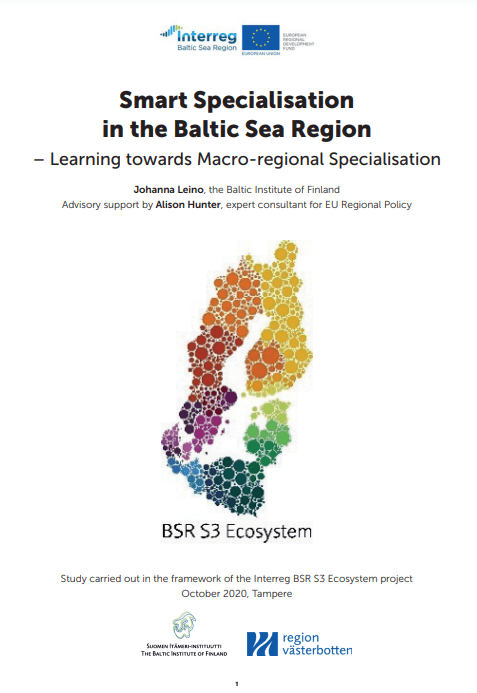
Adopting a value chain approach to inter-regional S3 collaboration across the Baltic Sea region
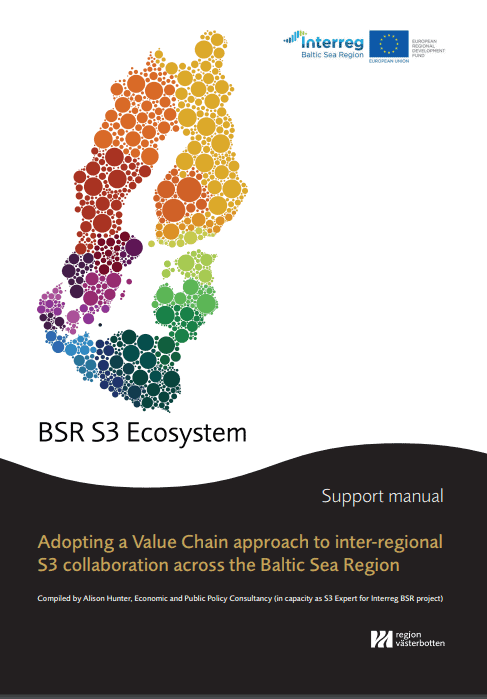
Guidance manual: High level value chain mapping in the Baltic Sea Region
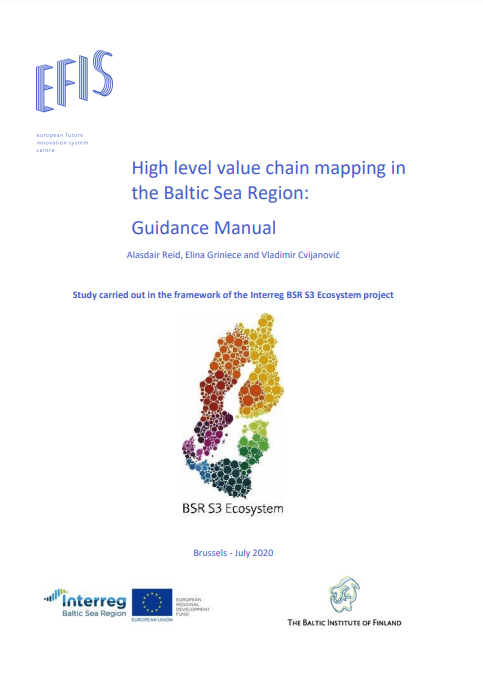
Study: High level value chain mapping in the Baltic Sea Region
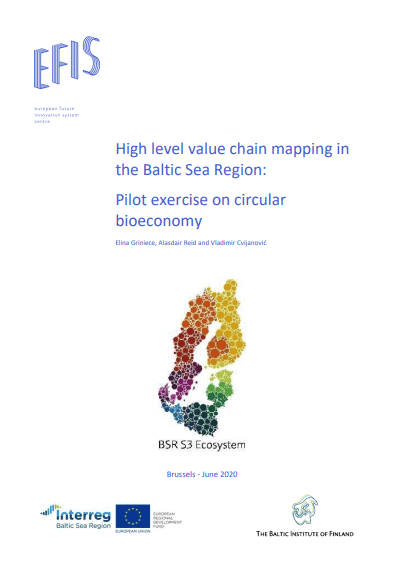
Policy guidelines for implementing the BSR S3 Ecosystem in the Baltic Sea region
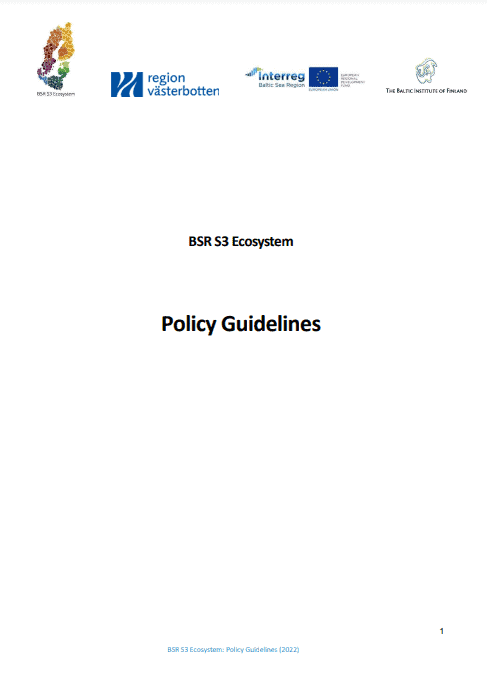
Project Stories
-
09.07.2021
Enterprises go smart beyond borders with Interreg
Small and medium sized enterprises largely fall behind other players in innovation and investments in research & development (R&D). Thanks to the Interreg project GoSmart BSR, enterprises in seven countries around the Baltic Sea learned how to use smart specialisation to improve competitiveness jointly and gain access to new markets.Read full story -
30.09.2020
Great project pictures that tell great Interreg stories!
More than seventy pictures competed in the Interreg Baltic Sea Region photo competition. Which projects were the best in illustrating transnational cooperation, grasping the essence of a project and its result, and presenting the 30th anniversary of Interreg? Congratulations to the teams of BalticRIM, RESQU2, Baltic Game Industry, EcoDesign Circle and GoSmart BSR!Read full story -
27.09.2021
Bio- and circular economy initiatives funded by the Baltic Sea Region Programme inspire
Transnational projects on bio- and circular economy funded by the current and earlier Interreg Baltic Sea Region Programmes are highlighted in the recent article published by the Baltic institute of Finland. They are taken as inspiring examples and good practices in the framework of the Smart Specialisation approaches.Read full story
Partners
Region Västerbotten
- TownUmeå
- RegionVästerbottens län
- CountrySweden
- RepresentativeMarta Bahta
- Phone
- E-Mail
- Web
The Baltic Institute of Finland
- TownTampere
- RegionPirkanmaa
- CountryFinland
- RepresentativeEsa Kokkonen
- Phone
- E-Mail
- Web
Aalto University
- TownEspoo
- RegionHelsinki-Uusimaa
- CountryFinland
- RepresentativeTaina Tukiainen
- Phone
- E-Mail
- Web
LAB University of Applied Sciences
- TownLahti
- RegionPäijät-Häme
- CountryFinland
- RepresentativeSusanna Vanhamäki
- Phone
- E-Mail
- Web
Hamburg Institute of International Economics (HWWI)
- TownHamburg
- RegionHamburg
- CountryGermany
- RepresentativeIsabel Sünner
- Phone
- E-Mail
- Web
Agency for Science, Innovation and Technology MITA
- TownVilnius
- RegionVilniaus apskritis
- CountryLithuania
- RepresentativeRima Dijkstra
- Phone
- E-Mail
- Web
Tröndelag County Council
- TownTrondheim
- RegionSør-Trøndelag
- CountryNorway
- RepresentativePer Erik Sörås
- Phone
- E-Mail
- Web
St. Petersburg State Budgetary Healthcare Institution "Medical Information and Analytical Centre"
- TownSt. Petersburg
- RegionCity of St. Petersburg
- Country
- RepresentativeAleksander Botyan
- Phone
- E-Mail
- Web
-
Project managerCathrine HultmanRegion Västerbotten
-
Legal representativeAnna PetterssonRegion Västerbotten
-
Financial managerMalin GavelinRegion Västerbotten
-
Communication managerCathrine HultmanRegion Västerbotten



